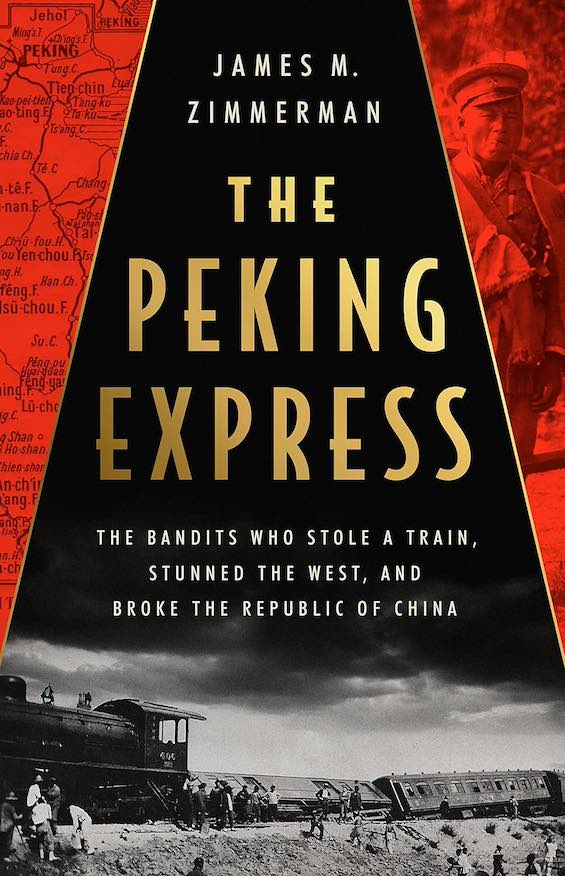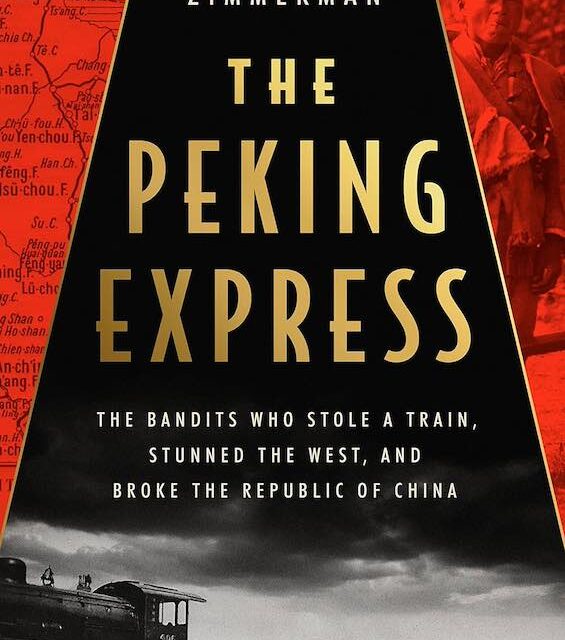
China has suffered through a series of titanic convulsions over the past two centuries. The Opium Wars, when the West seized control of the country. The Taiping Rebellion, which killed thirty million, and the Boxer Rebellion, when the West occupied Beijing. Fall of the Qing Dynasty. Japanese occupation (1937-45). And the civil war that led to the establishment of the People’s Republic of China. Not to mention the famine, deprivation, and terror later fostered by Mao Zedong. So, against this backdrop the Lincheng Incident a century ago may seem to deserve merely a footnote. But in its way the events described in James M. Zimmerman’s engrossing account of the incident, The Peking Express, also helped shape the course of Chinese history—and the country’s relationship to the outside world. Then, a century ago, a Chinese hostage crisis “broke the Republic of China.”
Estimated reading time: 6 minutes
They robbed a train and took hostages
As Zimmerman notes in a prologue, “China’s newly launched express trains—a showcase of its modernity—passed right through the heart of bandit country, their seats filled with prominent and wealthy passengers traveling back and forth between the raucously cosmopolitan city of Shanghai and the nation’s more austere but still thriving capital, Peking.” And on May 5, 1923, a dozen years after the overthrow of the Qing Dynasty, a massed force of more than 1,000 bandits derailed the Peking Express on its way northward from Shanghai, thoroughly looted the train, and took at least 300 passengers as hostages. It would take weeks to understand why.
The Peking Express: The Bandits Who Stole a Train, Stunned the West, and Broke the Republic of China by James M. Zimmerman (2023) 440 pages ★★★★☆

A Chinese hostage crisis that riveted the world’s press
Had those ” prominent and wealthy passengers” all been Chinese, few outside the country would never have known. But among them were 25 Westerners. John D. Rockefeller Jr.’s sister-in-law. Two American newsmen and two US Army majors. An extremely wealthy Italian lawyer close to Fascist leader Benito Mussolini. A group of major players in Shanghai’s Jewish community. A few others. And “a French veteran of the Great War who worked as a senior official with the Chinese Salt Administration.” The bandits prized all these people. There were also scores of well-to-do Chinese citizens. But “to the bandit gang, the Chinese captives had little ransom value, so they were simply murdered if they proved troublesome or if the bandits wanted to make an example of them to keep their other hostages in line.”
Warlords, bandits, and starving peasants
In the populous province of Shantung (today called Shandong) in northeastern China, a brutal warlord held sway in the capital a century ago. But bandits roamed freely in the southern reaches of the province. The warlord waged a ceaseless “bandit eradication” campaign but had never succeeded in pacifying the south. The largest of the outlaw bands—numbering at least 1,000 men and women, and continually growing—was led by two men.
The commander in chief of this so-called Self-Governed Army for the Establishment of the Country was Sun Mei-yao. Sun was twenty-five years old and “saw himself as a soldier, not a thief. . . His aims were revolutionary.” His second-in-command, known as Po-po Li, was in fact a thief and murderer with a long criminal record.
Sun commanded some 700 men, Li about 300, at the beginning of May 1923 when Zimmerman’s story began. Their combined force grew to several thousand as the hostage crisis unfolded.
A fascinating story and well told
Author James Zimmerman uncovered facts and insights like this through meticulous research into primary sources, a great many of them hitherto hidden from public scrutiny. Day by day through the nearly two months of the hostage crisis, he follows the action that unfolded in the train, during the attack, on the march with the hostages, and in the Chinese cabinet in Beijing (then Peking). Much of his account focuses on the weeks-long negotiations between representatives of the US, British, French, Italian, and Chinese governments with Sun Mei-yao, Po-po Li, and their sub-chiefs. It’s a fascinating story and well told.
Subscribe now. No ads, and it’s entirely free. >>>
The historical context
After two and a half centuries, the Manchu dynasty ruling China fell to republican forces in 1911. For a brief time, under the leadership of Sun Yat-sen, the forces of reform held out hope for a peaceful and prosperous future. But it was not to last. In fact, the Republican government never managed to assert control over most of the country. In province after province, warlords seized control. Some nominally supported the central government. Most did not. And almost everywhere desperate and disillusioned men and women defiantly struck out against the tyranny the warlords imposed. They all came to be called “bandits.” In truth, many were criminals. But most were either former soldiers released after the government lost in its attempt to oust the warlords—or starving peasants forced to take up arms.
About the author

According to his publisher, the Hachette Book Group, “James M. Zimmerman is a Beijing-based lawyer who has lived and worked in China for over 25 years. He is among China’s leading foreign lawyers and represents companies and individuals confronted with the political and legal complexities of doing business in Mainland China. He is the author of the China Law Deskbook, published by the American Bar Association, and is frequently featured as a political commentator on US-China relations in various print and broadcast media around the globe. [Zimmerman] is the former four-term Chairman of the American Chamber of Commerce in China. In addition to Beijing, he maintains a home in San Diego, California.” Zimmerman is a partner in the Beijing office of Perkins Coie LLP and counsels foreign companies on corporate, transactional, regulatory, litigation, and white collar criminal defense matters in China.
For related reading
Check out 30 insightful books about China.
You might also look up 20 top nonfiction books about history and Gaining a global perspective on the world around us.
And you can always find my most popular reviews, and the most recent ones, on the Home Page.



























